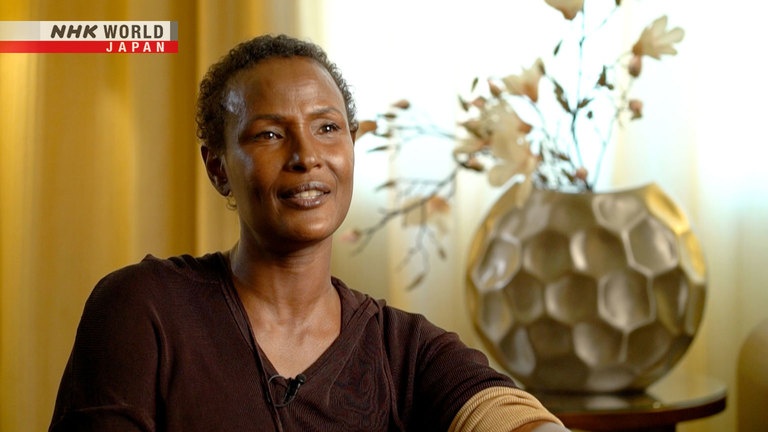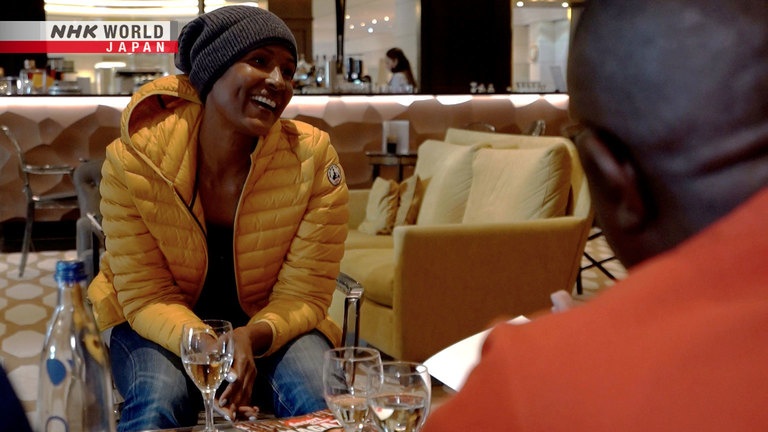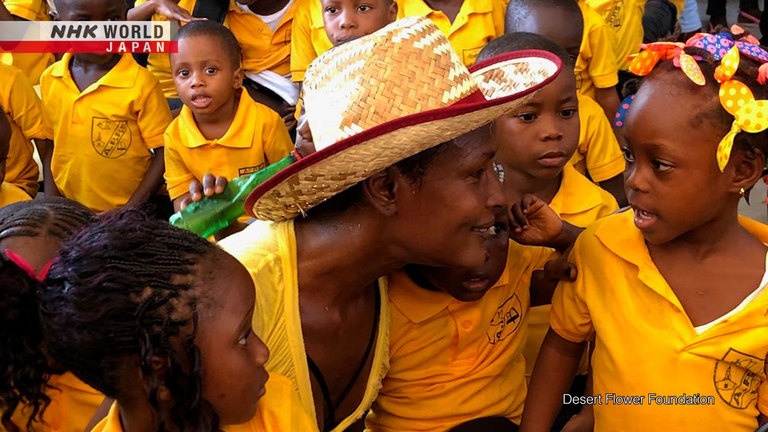Eradicating Female Genital Mutilation: Waris Dirie / Founder of Desert Flower Foundation
Victims of female genital mutilation reached 200 million. The UN has called for ending the practice, but it still continues. Waris Dirie is fighting to eradicate FGM through her own testimonies.



Transcript
Direct Talk
This story has content that may not be suitable
for everyone. Viewer discretion is advised.
Today's guest on Direct Talk is Waris Dirie.
She has been calling for an end to
female genital mutilation or FGM for 25 years.
It's a practice that has been going on
in the African continent and in Asia.
What is the meaning of this?
Why do you need
why anybody need to do this to you?
Because you don't need it.
And it's not, it's against God.
More than 200 million women worldwide
have gone through FGM.
The procedure is life threatening
and ignores the basic rights of women
that can leave deep emotional wounds.
Dirie has undergone FGM herself.
She has joined forces with the United Nations
to introduce laws against the practice globally.
She has also been working on
establishing medical centers,
supporting victims.
We ask Dirie more about
how she is fighting genital mutilation,
so that women everywhere can be liberated.
Eradicating Female Genital Mutilation
FGM is female genital mutilation,
is where they cut the girl
or woman genitalia,
the most sacred place
they go and try to destroy it
which is forbidden for any...anyway.
And for the reason they do it
is to limit the sexuality of a woman
so she do not hang around,
and do whatever freedoms she chooses to do
or pleasure to chooses to
it's just control,
pure control for the woman,
What is the word?
Diabolical shit
you ever heard to do
to any human being to think about it.
Or the pain or child cry.
I can't hear this, this damage for me.
So I thought maybe the world
will jump when they see this.
Oh you know what pushing you anger?
frustration
at not understanding what the reason
or what how you can do
such abusive things. Is it okay?
Is it Okay?
No.
"Desert Flower" 2009
Based on Waris Dirie's autobiography.
Female genital mutilation is thought
to be performed as rites of passage.
intended to lead girls into adulthood.
A razor is often used
in an unsanitary environment.
Heavy bleeding sometimes leads to
infections and even death.
In 2012,
the UN General Assembly adopted a resolution
banning the practice
saying it was inhumane
and leaves deep physical
and emotional scars to women.
However, FGM still goes on in some places.
Currently about 200 million victims exist.
There are still regions where
FGM is performed on over 90% of women.
The Prevalence of FGM
Dirie has been a pioneer
in stopping this practice.
She has launched a non-profit organization
called Desert Flower Foundation.
It operates worldwide.
Desert Flower Center Waldfriede Berlin
Its Berlin facility was established in 2013.
It comes with
fulltime medical staff and equipment.
Treatment is provided for free.
They have psychological problems,
sometimes sexual problems.
So we talk to them
and part of them about 50%
later come to reconstructive surgery,
which is done in our hospital.
More than 3000 women
have been treated here in the past 9 years.
There is no such a
professional person to do this.
But somebody,
just one day and a lady start doing it,
and she becomes the cutter.
But then nobody educated her
nobody teach her how to do what to do.
So they do all kinds of
horrendous damage to the girls.
Some are bleeding to death,
some are damaged so badly
some are disfigured
from all inside the vagina some.
It just it is agony for these people.
It's just so unfair.
So pain continues again and again.
And it is really terrible.
Who is in charge of this?
You know what I mean.
I didn't know what the hell is going on.
And I wasn't taking this.
So I just I said
I have the world have to change.
Dirie was born in the
East African country of Somalia, in 1965.
She experienced genital mutilation
when she was 5 years old.
You can read it all about in my diary,
I'm not going to go line to line for that.
It's...
It's just not good, not pride, not.
Women suffer so much of this.
It's the past Dirie doesn't like to revisit.
We took an excerpt
from her autobiography in 1997.
"All I could think about was
the pain between my legs."
"I knew a lot about being an African woman:
I knew how to live quietly
with suffering in the passive,
helpless manner of a child."
FGM left Dirie with deep emotional wounds.
But tragedy continued.
Eight years later, she was ordered by
her father to marry an elderly man.
He came up with this:
Come on, sit down here with me down,
one evening from my home.
And he says "You know. I gotta find for you.
I have a husband for you, baby."
"A good man."
Oh, man, well,
let's take that same age as my father.
Really really. I see the face exactly now.
I couldn't see my life.
I saw my life buried dead.
I said then I say, "Father. No."
"It's not gonna happen.
But papi don't do it."
"Don't stress yourself.
I'm telling you now. It's not gonna happen."
I ran in the middle of the night.
My father Trunk threatened,
"You go, I find you or die or you're gonna..."
"You find and catch me if you come first."
And he tried to follow me
for two days in the foot
following my footsteps in the desert.
And every time I hear him his voice
I'm going down what he's coming up with one.
And he couldn't do it.
So he gave up. He went back.
Dirie ran away from home when she was 13.
She escaped by
walking through the desert alone
and looked for her relative
living in Mogadishu.
One of them was her uncle,
who was an ambassador.
She went with him
during his transfer to London.
Dirie then became a model
after being recruited
when she was working
at a fast-food restaurant.
She got on magazines like Vogue
and became a top model.
She talked about her experiences of going
through FGM for the first time when she was 32.
This was during a magazine interview.
That experience inspired her mission today
to end female genital mutilation.
I started the FGM, it wasn't easy.
It was a lonely a shocking
and hideous time of me.
Everybody was looking at me like
what did she just say?
What is she talking about?
Oh god I'm sorry.
I found so...
I'm in the ignorant of the world
is another one.
And after this, I decided to do a book
and I provide it
for the schools and libraries.
That was the only mission I made the book.
Because somebody can read it
and do something with it.
The great thing is because of the book,
you know, the world became aware
was a good thing.
I do believe there was I have made a change
in my little effort as I try my best.
Female genital mutilation
has captured global attention
through Dirie's testimonies.
The United Nations set a goal of ending FGM.
To make this happen.
Dirie was appointed as a Special Ambassador for
the Elimination of Female Genital Mutilation.
In 2002, she established
her non-profit, "Desert Flower"
and continues her activities
through this organization.
Her efforts have been paying of
Laws to stop FGM have been enacted
in places like Kenya and Nigeria.
Numbers are expected to fall dramatically.
But genital mutilation
still continues in some regions.
That's because there are physicians who claim
that there are no problems with FGM
if health checks are done properly.
Dirie says otherwise
and the physical and mental wounds
of the practice can't be ignored.
and she continues to speak out
to end female genital mutilation.
That's how makes, okay?
Because it's at the same crime.
Whether you do it this way,
or that way under down?
It's the same crime you committed.
Young girls do not want in Africa
not, not one girl want this
First, you know,
the laws.
You can make a law,
but you have to implement them.
You have to follow them.
You have to force them to...
to whatever it is that's harmful or wrong.
Because it's you do it or you don't do it,
this kind of behavior.
And
if the, if governments, if law,
if politicians don't stand up
and say this is from today's
you know never ever ever ever
and you find that you will be truly punished,
if this don't happen
people continue their own ways.
Dirie has started a new project in 2018.
She's helping to build schools in regions
where genital mutilation is still practiced
Desert Flower School (Sierra Leone)
connecting and educating girls there
to eradicate FGM.
It's a contract that I will take your child
because they all want to
give the children education one.
This they know this is good for their child.
But you promise me never ever to touch her.
And if I find that you did, you lost.
Your child lost, you lost
because they get food to a gift them.
The mothers get food the house
because it's a poor country,
you know, 30 euro a month we feed the family.
So they don't have to use this excuse,
"I have to sell my child"
"forced marriage"
"mutilation...,"
no.
All this is out.
This is when you bring the
next generation and educate them.
Dirie is also involved in producing
a musical about genital mutilation.
It's to spread the word
to developed countries.
The Coronavirus has stalled the production.
But it will be restarted in various places
in Europe by the summer of 2022.
There's the musical is so relevant
in today's life in today's world,
where it's you have sexual abuse,
you have a child crime,
you have a crime against women,
you have gender inequality.
You have strength and the will to say
I can survive anything
no matter what you're trying to do to me.
You know, you take a step and back.
But you never give up the right or fight.
I'm still have empty somewhere
and I want to finish this
and I think the movie, the book,
me running around
I'm not satisfied this yet.
It's not is the world didn't get it yet.
Dirie has left us with this word.
Love is my message all around.
There's no other reason
I exist in the world of this!
Yeah, I live in life and
continue on do too much things to
But you know,
you know my main mission is really
is my foundation
on my children
and loving life.